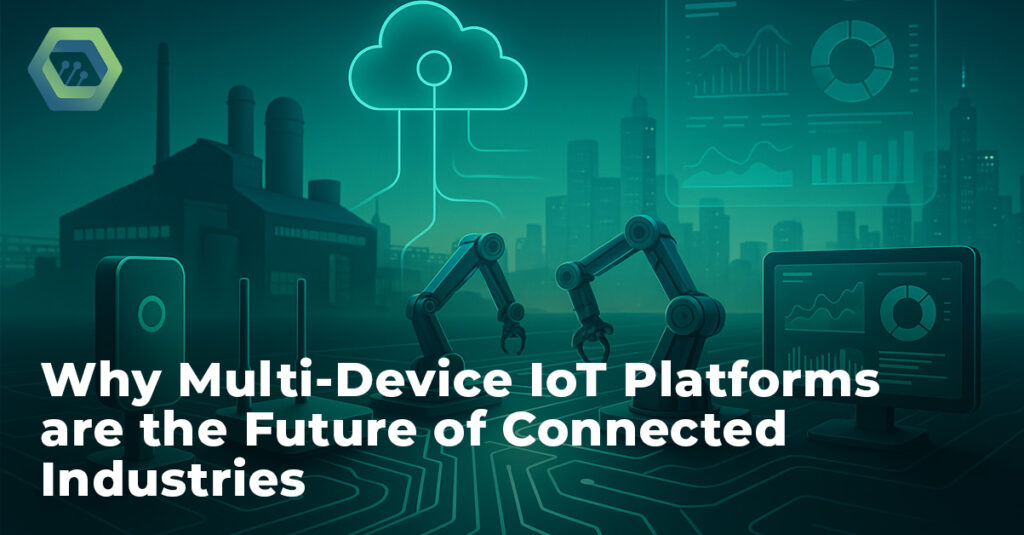Industries around the world are changing fast. From healthcare and manufacturing to logistics and retail, companies are moving toward digital operations. At the heart of this transformation are Multi-Device IoT Platforms.
These platforms are not just about connecting a few machines or sensors. They are designed to bring together hundreds, sometimes thousands, of devices into one ecosystem where they can communicate, share data, and create real-time insights. This is what makes Multi-Device IoT Platforms a foundation for connected industries.
In this article, we’ll break down what multi-device platforms are, why they matter, their benefits, challenges, and why they’re considered the future of industrial growth.
What Are Multi-Device IoT Platforms?
A Multi-Device IoT Platform is software that allows multiple types of devices — sensors, machines, wearables, gateways, and controllers — to connect, communicate, and be managed from one place.
Think of it like a universal remote. Instead of having separate systems for your lights, TV, and speakers, one remote controls everything. In the same way, these platforms allow businesses to manage all devices on a single dashboard.
For example:
- A hospital can connect patient monitors, smart beds, and temperature sensors.
- A factory can connect robotic arms, energy meters, and predictive maintenance sensors.
- A logistics company can connect vehicle trackers, warehouse temperature monitors, and RFID scanners.
Without a Multi-Device IoT Platform, managing so many different devices would be chaotic.
Sources
Why Are Multi-Device IoT Platforms Important?
Industries no longer rely on just one type of device. A manufacturing plant may need vibration sensors for machines, cameras for quality inspection, and wearables for worker safety. If each of these devices had its own separate system, managing them would waste time and create data silos.
Multi-Device IoT Platforms solve this problem by unifying everything. They:
- Provide centralized control of all devices.
- Ensure data flows smoothly between machines and systems.
- Help industries scale easily by adding new devices without rebuilding infrastructure.
This makes them essential for any industry aiming to stay competitive in the digital era.
Benefits of Multi-Device IoT Platforms
Adopting Multi-Device IoT Platforms comes with clear advantages:
1. Unified Management
All devices are monitored and controlled from a single dashboard, saving time and reducing complexity.
2. Cost Efficiency
Instead of running separate systems for each device type, one platform manages everything, cutting costs.
3. Real-Time Data Insights
When devices across the factory or office are connected, industries get real-time data that helps in quick decision-making.
4. Scalability
Businesses can start small and add more devices later. The platform can handle growth without major changes.
5. Enhanced Security
Modern platforms come with strong encryption and access controls, making sure sensitive data is safe.
6. Automation and AI Integration
IoT platforms allow businesses to set automation rules — like turning off machines at low demand hours or sending alerts when devices cross thresholds. With AI integration, insights become even smarter.
Real-World Use Cases
Here’s how Multi-Device IoT Platforms work across industries:
- Healthcare: Patient monitoring systems, smart wearables, and pharmacy storage sensors are linked on one platform to improve care.
- Manufacturing: Robots, assembly line sensors, and energy meters all connect for smooth operations and predictive maintenance.
- Smart Cities: Traffic lights, parking systems, waste bins, and streetlights are managed from one control center.
- Retail: Smart shelves, inventory trackers, and energy management systems help stores save money and serve customers better.
- Logistics: Fleet trackers, warehouse sensors, and delivery updates all run on the same platform to keep supply chains efficient.
Industrial IoT
Challenges of Multi-Device IoT Platforms
Even though the benefits are clear, industries face some challenges:
- Integration Issues – Older machines may not support IoT without additional hardware.
- Data Overload – Thousands of devices produce a huge amount of data, which needs efficient management.
- Security Risks – More devices mean more entry points for cyberattacks.
- Skill Gaps – Employees need training to manage platforms effectively.
Forward-looking companies are already solving these challenges with modern, scalable platforms that support upgrades and have built-in security.
The Role of Multi-Device IoT Platforms in Industry 4.0
Industry 4.0 is built on automation, AI, and connectivity. Without Multi-Device IoT Platforms, Industry 4.0 would not be possible.
These platforms:
- Enable predictive maintenance for machines.
- Improve supply chain visibility.
- Boost energy efficiency across operations.
- Drive data-driven decision-making.
As industries continue to digitalize, having one platform that supports many devices will no longer be optional — it will be mandatory.
The Future of Multi-Device IoT Platforms
The future looks exciting for Multi-Device IoT Platforms. Some trends shaping the future include:
- AI + IoT (AIoT) for smarter, automated insights.
- 5G connectivity for faster and more reliable communication between devices.
- Edge computing for real-time processing near devices.
- Sustainability tracking to help businesses reduce their carbon footprint.
By 2030, it’s expected that most industries will run on multi-device platforms as standard practice.
Final Thoughts
As industries evolve, the ability to connect and manage multiple devices seamlessly becomes critical. It provide the foundation for connected industries by offering centralized management, cost savings, real-time insights, and scalability.
Whether in healthcare, manufacturing, logistics, or retail, the future of digital transformation will depend heavily on these platforms. Businesses that adopt them today will be far better prepared for tomorrow.And when it comes to reliable IoT solutions, OmniWOT is leading the way. With its robust, secure, and scalable IoT platform, OmniWOT ensures businesses can connect any device, across any industry, with ease. For industries aiming to thrive in the connected future, OmniWOT is the partner that makes it possible.


